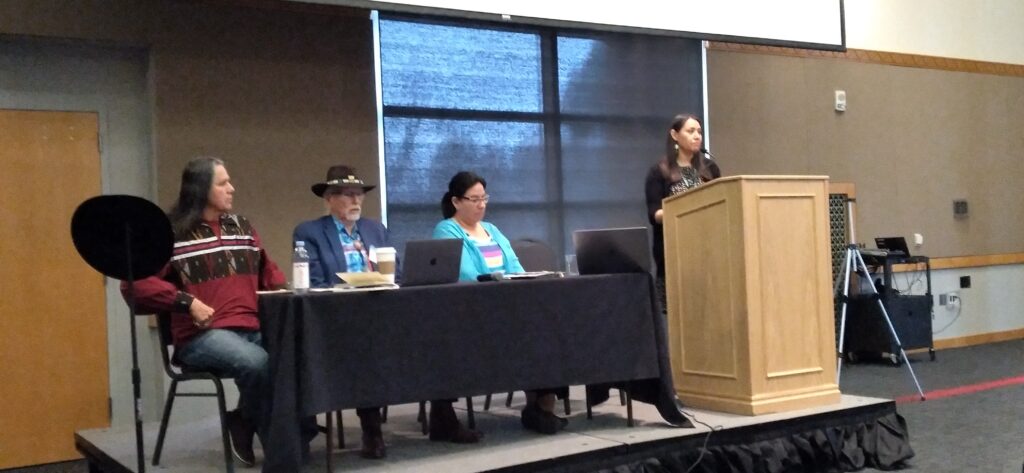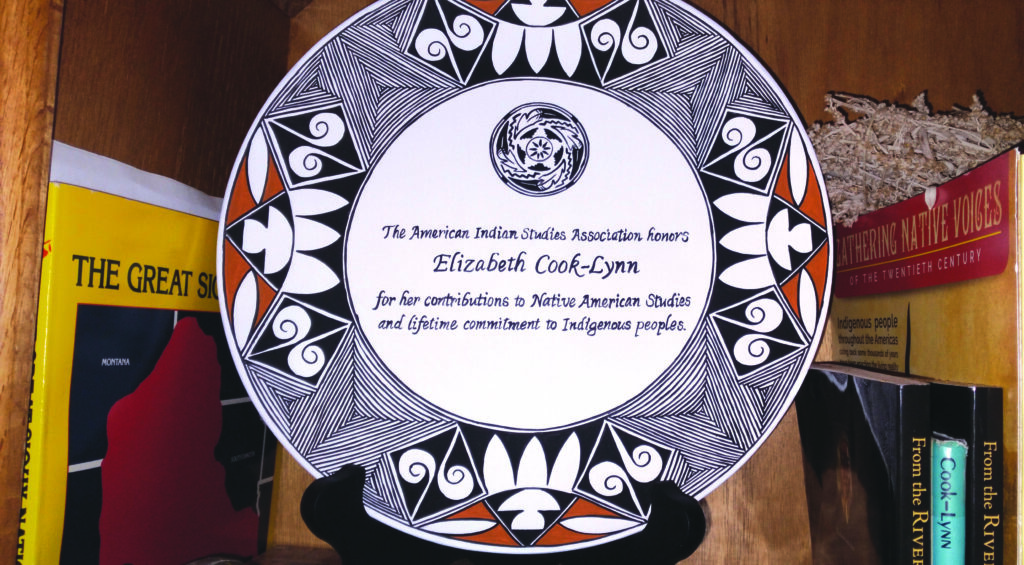‘Indigenous Well-being’ theme of 25th Annual Indian Studies Association Conference

The AISA panel from left to right: Ed Valandra (Sicangu Lakota) Senior Editor of Living Justice Press, James Riding In (Pawnee) Professor Emeritus, ASU, Sarah Hernandez (Sicangu Lakota) Assistant Professor at UNM and Melanie Yazzi (Dine) Assistant Professor at University of Minnesota. (Photo by Marnie Cook
ALBUQUERQUE – “Colonialism is all around us and we think it’s normal”, said Dr. Ed Valandra (Sicangu Lakota) as he spoke before the 25th Annual Indian Studies Association Conference at the University of New Mexico.
I was there by invitation of the AISA board to accept a posthumous honor presented to my mother, Dr. Elizabeth Cook-Lynn, by the board for her contributions to Native American Studies and her lifetime commitment to Indigenous peoples through her scholarship.
“The Black Hills is a playground for white and Black settlers.” Valandra continued as he spoke before a plenary panel honoring the scholarship of my mother, the late professor Dr. Elizabeth Cook-Lynn (Crow Creek Sioux). This was the very kind of incendiary comment my mother was known for, what Valandra described as my mother’s uncompromising strength.

The plate honoring Elizabeth Cook-Lynn for her contributions to Native American Studies and a lifetime commitment to Indigenous peoples was made by artist Sherry L. Aragon, Acoma Pueblo. (Photo by Marnie Cook)
I was grateful to have been asked to be my mother’s representative. Over the years, I often was not able to attend my mother’s lectures and book-readings, so it was a privilege to hear her colleagues talk about American Indian Studies, reaffirm the goals of the discipline, discuss ideas and talk about the important work still being done. Former students spoke about how Dr. Cook-Lynn’s steady, unflinching and unapologetic voice helped them to find their voices. They each spoke about the importance of her mentorship in their success. Each one had a story to share about how her blunt criticism of their work helped them to be better. They said her strength helped them understand and stand up to the racism perpetrated on them by non-Native instructors and professors.
I always told my mother that she was probably one of those writers whose scholarship wouldn’t be truly recognized until after she passed. Over the last couple of decades, audiences coming to her book-readings at her favorite bookstores across the country like Tattered Cover and Elliott Bay had begun to grow slim.
Her life’s work was dedicated to Indian Studies as a discipline and not a “stepchild of anthropology, history, English, social work, or sociology.” Those are James Riding In’s (Pawnee) words and are the sentiments of my mother, who always defended Indigenous/Indian/Native/American Indian Studies as a stand-alone discipline rather than a subset of ethnic studies, history or anthropology. “No one can equal Elizabeth Cook-Lynn’s scholarship in the field,” said Riding-In.
Riding In is a colleague of my mother’s. He became editor of the Wicazo Sa Review, a journal my mother co-founded in 1985 which has been dedicated to the mission of helping Indigenous peoples of the Americas to take possession of their own intellectual and creative pursuits. Riding-in says that American Indian Studies should never function as the handmaiden to colonials. Cook-Lynn has always insisted on a tribal studies model based on sovereignty and indigeneity.
Wicazo Sa Review provides articles, essays, interviews, reviews, literary criticism and scholarly research pertinent to Native American Studies and related fields as well as a variety of themes of decolonization Currently, Dr. Lloyd L. Lee is the editor of the WSR who said that the journal is in “good shape” as an empowerment model, even as Indian Studies continues to be marginalized and co-opted by settler systems.
This year’s AISA theme was Indigenous Wellbeing, a most relevant topic considering a plethora of issues that continue to plague Native Americans. The solutions offered by the settler/colonial system are failures because they are culturally irrelevant to Native Americans. Experts and researchers seeking solutions to high rates of hopelessness, homelessness, poverty, addiction and suicide among Native Americans fail because the solutions are incompatible with Indigenous value systems.
There are also issues of ill health among Native populations because of a lack of access to adequate healthcare leading to a distrust of institutions and doctors. Research published in the Journal of American Medicine reports that lack of health nutrition creates changes in the immune system as does chronic stress. Native American populations report suffering from chronic stress due to racism and racial discrimination. JAMA suggests in a 2020 article that research to determine impacts on American Indian individuals is critical and should be performed in the context of historical trauma and racism and racial discrimination. The federal government which had signed nation to nation treaties promising to provide healthcare to the tribes who gave up the most land continues to fall short of its promises. And in many instances appears to be as resistant to Native sovereignty as ever.
Valandra is the Senior Editor of Living Justice Press and was at one time elected President of the American Indian Studies Association, which Living Justice says is the signature association for the discipline of Native Studies. Valandra said that Cook-Lynn wrote some seminal pieces, for instance “Who Stole Native American Studies,” which describes the efforts in the 1970’s to create the discipline and a plan of action which included degreed Native Americans seeking tenured university appointments to develop the program to gain academic influence and control over our own narrative. But by the late 1980’s and early 1990’s, the discipline had been co-opted and absorbed into ethnic studies departments. Expert Native Americans in the field still hadn’t been appointed to positions as Indian Studies department heads which was usually relegated to a non-Native.
Dr. Sarah Hernandez (Sicangu Lakota), Assistant Director of Native American Literature and the Director of the Institute of American Indian Research at the University of New Mexico also recounted her experience at South Dakota State University. As the program was being remodeled it was also being staffed with non-Native instructors and professors, with the usual few tokens. Hernandez found the University falling short in its efforts to represent Native Americans not unlike the state’s history of erasing Native American presence from education. Like many Native American students, Hernandez said it was making her physically ill, so she found a position at the University of New Mexico, where they have a robust commitment to Native American Studies. “It’s a disgrace that we can’t teach in our homelands,” said Hernandez.
I listened to my mother’s many colleagues and former students say that her scholarship on the subject of Native American Studies is essential to the discipline and no one can equal her work. These were my thoughts too, about my mother’s body of work, but then again, I am not a scholar.
In fact, I debated whether or not I was legitimate enough to represent her scholarship. I am not a scholar. I am not an expert on Indian Studies as a discipline. I am not even a college graduate, although I did attend college and majored in Music and then Journalism, but never graduated. I did eventually get a certificate in broadcasting and had a 30-plus year career in broadcasting. While I spent the early years of my career “spinning records” I remained employed during the “frenzied” buyouts of broadcast properties during the years of deregulation of the industry that wiped out jobs, allowed media consolidation and crushed diversity in content and media ownership. The last 12 years of my career I had spent madly writing local news stories for a local news/talk radio station. Even though I had spent my career in a related field, I did feel a little out of place before this roomful of experts, colleagues of my mother, academics, Ph.D.’s, writers and scholars.
Few things change here in South Dakota as efforts to incorporate information pertaining to the tribes into the curriculum have been removed and erased, narratives that Natives enjoy being homeless persist and are repeated by city leaders, and efforts to talk about feeding and housing our people are ignored and prevented and the solutions approved by the settler/colonial apparatus are always oppositional to our value systems. It can be a burden to carry that every day but know that in other places, change is underway.
James Riding In mentioned the death of M. Scott Momaday as well, and the passing of these scholars and leaders who paved a path for us to follow. Riding In repeated my mother’s message that every person who had been touched by her scholarship carries with them, “protect and defend tribal nationhood, don’t be afraid because you will be contested and don’t make white people comfortable.”
(Contact Marnie Cook at staffwriter@nativesunnews.today)
The post ‘Indigenous Well-being’ theme of 25th Annual Indian Studies Association Conference first appeared on Native Sun News Today.
